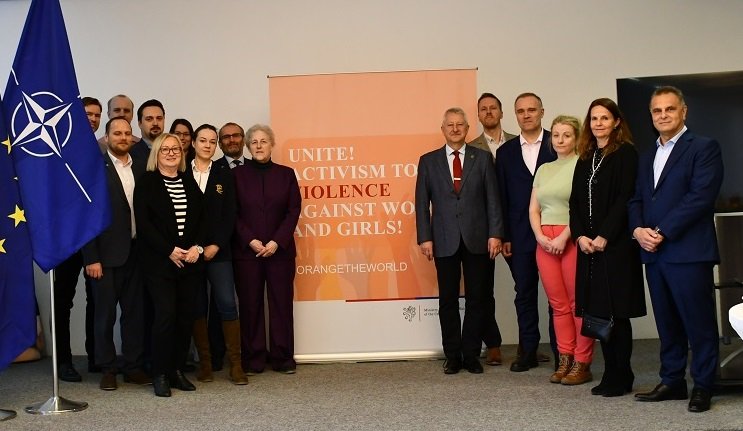
Czech diplomats in Beijing join the the UN campaign to end violence against women „Orange the World!“
24.11.2023 / 12:19 | Aktualizováno: 24.11.2023 / 12:33
The embassy of the Czech Republic in China joins the 16 Days of Activism against Gender-Based Violence which will take place from 25 November until 10 December 2024. Violence against women is the most pervasive breach of human rights worldwide. Despite many countries passing laws to combat violence against women, weak enforcement and discriminatory social norms remain significant problems. Globally, an estimated 736 million women — almost one in three — have been subjected to physical and/or sexual intimate partner violence, non-partner sexual violence, or both, at least once in their life.
The 16 Days of Activism against Gender-Based Violence is an international civil society led campaign that takes place each year. It commences on 25 November, the International Day for the Elimination of Violence against Women, and ends on 10 December, Human Rights Day, indicating that violence against women is the most pervasive breach of human rights worldwide. It was originated by activists at the inaugural Women's Global Leadership Institute in 1991. It is used as an organizing strategy by individuals and organizations around the world to call for the prevention and elimination of violence against women and girls (VAWG).
In support of this civil society initiative, under the leadership of the UN Secretary-General, António Guterres, the United Nations Secretary-General’s UNiTE by 2030 to End Violence against Women initiative (UNiTE) calls for global action to increase awareness, galvanise advocacy efforts and share knowledge and innovations to end VAWG once and for all. Launched in 2008, UNiTE is a multi-year advocacy effort aimed at preventing and eliminating VAWG around the world. UNiTE calls on governments, development actors, civil society, women’s organizations, young people, the private sector, the media and the entire UN system to join forces in addressing violence against women and girls.
Violence against women has been heightened across different settings as well, including the workspace and online spaces. A global study by the Economist Intelligence Unit found that 38 per cent of women have had personal experiences of online violence, and 85 per cent of women who spend time online have witnessed digital violence against other women. A global study on women working in the technology sector found that 44 per cent of women founders had experienced some form of harassment at work in 2020, of which 41 per cent of women experienced sexual harassment.
Furthermore, the COVID-19 pandemic, conflicts, and climate change have further intensified VAWG, exacerbated existing challenges and generated new and emerging threats. Economic insecurity, disrupted livelihoods and limited social protection continue to increase women’s and girls’ vulnerability to violence. According to the Rapid Gender Assessment surveys (RGAs) on the socioeconomic impacts of COVID-19 conducted by UN Women in 58 countries, 45 per cent of women reported that they or a woman they know has experienced a form of VAW since COVID-19. Following Hurricane Katrina, the rate of rape among women displaced to trailer parks rose 53.6 times the baseline rate in Mississippi for that year.
For further information on the campaign please refer to the UN website.




